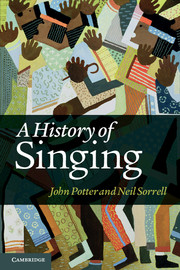Book contents
- Frontmatter
- Contents
- Acknowledgements
- Introduction
- Part I Imagined voices
- Part II Historical voices
- Chapter 3 The emerging soloist and the primacy of text
- Chapter 4 The age of the virtuoso
- Chapter 5 The nineteenth-century revolution
- Part III Recorded voices
- Chapter 6 A Great Tradition: singing through history – history through singing
- Chapter 7 Classical singing in the twentieth century: recording and retrenchment
- Chapter 8 Post-classical: beyond the mainstream
- Chapter 9 The emancipation of the popular voice
- Chapter 10 Sung and unsung: singers and songs of the non-English-speaking world
- Sources and references
- Bibliography
- Index
Chapter 6 - A Great Tradition: singing through history – history through singing
Published online by Cambridge University Press: 05 June 2012
- Frontmatter
- Contents
- Acknowledgements
- Introduction
- Part I Imagined voices
- Part II Historical voices
- Chapter 3 The emerging soloist and the primacy of text
- Chapter 4 The age of the virtuoso
- Chapter 5 The nineteenth-century revolution
- Part III Recorded voices
- Chapter 6 A Great Tradition: singing through history – history through singing
- Chapter 7 Classical singing in the twentieth century: recording and retrenchment
- Chapter 8 Post-classical: beyond the mainstream
- Chapter 9 The emancipation of the popular voice
- Chapter 10 Sung and unsung: singers and songs of the non-English-speaking world
- Sources and references
- Bibliography
- Index
Summary
APOLOGIA
The focus of this chapter is the classical music of the Indian subcontinent, especially the Hindustani tradition of the northern two-thirds. We have decided on this as the topic of a whole chapter because it is probably the best Eastern counterpart to the Western traditions (principally of art music) that fill much of this book, and it also has special importance to the history of singing. There is probably no tradition on earth that places such emphasis on singing as Indian music, even if its instrumental manifestations are probably far better known around the world. The concept of ‘Great Tradition’ was prevalent in anthropology some fifty years ago and used to describe literate, mainly urban traditions practised and received by an elite minority (as opposed to the ‘Little Traditions’ of rural peoples). Though not much used today, the concept survives and can be mapped on to long histories, and perhaps a long future. The ‘Great’ and the ‘Little’ are by no means entirely separate but they incorporate elements of each other’s practices. Indian civilisation was cited as a prime example of this polarity, for good reason: in music it has a clearly delineated Great Tradition and also a plethora of Little Traditions and the two have intermingled over the centuries; the same can be said of Europe and what is loosely termed Western music. Among the many problems in the ‘great–little’ opposition is the tendency to keep ‘great’ for so-called classical traditions and ‘little’ for everything else. This duplicates the separation of Western classical music from World Music (also folk music, pop music, jazz and so on) and can also invidiously separate literate traditions from oral ones. Ingrained in us are several assumptions that must be questioned: ‘literate’ is superior to ‘illiterate’ (as it suggests education versus the lack thereof); long traditions are superior to newer, less tested ones; musical training is formalised and usually happens in conservatoires. Indian classical music does rest on a very long tradition and depends on rigorous training (hardly ever received in institutions) but not on the literacy of the practising musicians. Although a vast body of theoretical treatises exists most musicians do not (even cannot) read such texts. Similarly, a simple notation system has been devised for the music with which musicians will be familiar but probably never use, and certainly never in performance.
- Type
- Chapter
- Information
- A History of Singing , pp. 151 - 192Publisher: Cambridge University PressPrint publication year: 2012



